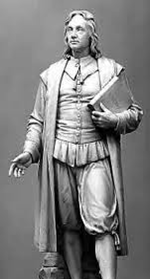 “You are a good man; we will not harm you.” Roger Williams was face to face with the fierce Native American warriors. There was fighting all around him, and the town was on fire. Roger was an old man now, and the Indians still respected him. Perhaps he was the only white man in the colonies that they trusted. This time, however, his peace-making efforts had been swept aside.
“You are a good man; we will not harm you.” Roger Williams was face to face with the fierce Native American warriors. There was fighting all around him, and the town was on fire. Roger was an old man now, and the Indians still respected him. Perhaps he was the only white man in the colonies that they trusted. This time, however, his peace-making efforts had been swept aside.
Roger Williams was a pioneer in politics, theology, church-planting, anthropology, and linguistics. He is best known as the governor of Rhode Island, the founder of the First Baptist Church in America, and an early advocate of religious liberty. He is less known for laying the groundwork for missions among the Native American tribes of New England.
Born in England c. 1603, Williams was converted as a young man. In college, he studied theology, Greek, and Hebrew. His separatist views brought the persecution of the archbishop, and he sailed for America in 1630. Upon arrival, he discovered that the Puritans were not as separated from the Church of England as they professed to be. There was no religious liberty. The state enforced the doctrines of the church. They persecuted Baptists and Quakers. They treated the Indians as inferior and took their land by force.
Williams pastored two different churches during a five-year period. His own churches loved him, but the community hated him for his outspoken views. He strongly opposed the unfair treatment of Native Americans, urging that the colonists pay the Natives for the land. He also preached the right of every man or woman to follow his or her own conscience in religious matters.
The Salem court sentenced Williams to banishment in the winter of 1635. He fled on foot into the snowy forest. He walked 105 miles to an Indian village where he was accepted into their homes for the winter. The following spring, he was joined by his wife and ten of his friends, and together they founded Providence Plantation, and eventually Rhode Island colony.
Williams was a true friend to Indians and settlers alike. As a peacemaker, he saved the colonies on several occasions. He studied the Algonquin language and wrote a linguistic key called, A Key into the Language of America. This book also contained many pages of cultural notes, touching every aspect of culture—from salutations to death and burial. He laid the groundwork for Bible translation and the missionaries who would come after him.
Near the end of his life, Williams saw his own town of Providence burned to the ground and many of his friends killed in King Phillip’s War. However, he lived to see peace restored and the town rebuilt.